
Springtime First Aid: Essential Homeopathic Remedies for Common Issues
As springtime approaches, many of us eagerly anticipate warmer weather and outdoor activities. However, along with the joys of spring come certain hazards and mishaps that can restrict our enjoyment.
Do you ever find yourself wondering how to handle those inevitable mishaps?
In this blog, we'll explore some of the most common springtime issues and highlight essential homeopathic remedies to have on hand. Whether dealing with insect bites, sunburns, minor injuries, or allergic reactions, these remedies can relieve and support your body's natural healing processes.
So, let's dive in and learn how to tackle springtime mishaps with confidence and ease.
BM187 may help with energy levels. Useful for consistent or occasional fatigue, appetite loss, and aching pains. It is effective for periods of stress or illness recovery.
1. Importance of being prepared
During this season, we often spend more time outside, exposing ourselves to insects like mosquitoes, bees, and wasps. These critters can leave us with itchy bites or even painful stings.

Additionally, the increasing intensity of the sun's rays can lead to sunburns, causing redness, pain, and discomfort. Furthermore, outdoor sports or recreational activities may sometimes result in minor injuries like bruises, strains, or sprains.
Being aware of these potential hazards and knowing how to address them promptly can make all the difference in enjoying a safe and pleasant springtime experience.
2. First Aid Kit Essentials
Along with the beauty of spring comes the potential for accidents and mishaps. That's why having a well-equipped springtime first aid kit is essential.
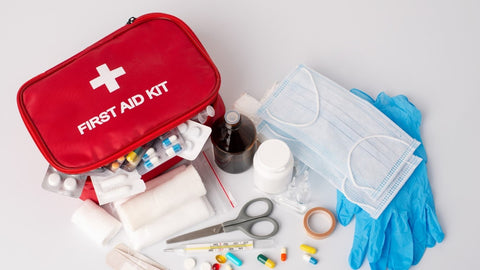
Here's what you should include:
1. Bandages and Dressings: These are crucial for covering wounds and protecting them from dirt and bacteria. Include a variety of adhesive bandages in different sizes, sterile gauze pads, and adhesive tape.
2. Antiseptic Wipes or Solution: Proper wound cleaning can prevent infections. Pack antiseptic wipes or a small bottle of antiseptic solution to disinfect cuts and scrapes.
3. Tweezers and Scissors: Tweezers are handy for removing splinters or debris from wounds, while scissors can help cut bandages or clothing if needed.
4. Sunscreen: Protect your skin from harmful UV rays by packing a broad-spectrum sunscreen with SPF 30 or higher. Reapply it every few hours, especially if you spend a lot of time outdoors.
5. Insect Repellent: Keep pesky bugs at bay with insect repellent containing DEET or picaridin. Apply it to exposed skin and clothing to prevent insect bites.
6. Instant Cold Packs: Instant cold packs can soothe minor burns, insect bites, or injuries by reducing swelling and numbing pain. They are convenient and don't require refrigeration.
7. Emergency Contact Information: Include a list of emergency contacts, such as family members, friends, and healthcare providers. Also, jot down important medical information, like allergies or existing health conditions.
8. Disposable Gloves: Include a pair of disposable gloves in your kit to protect yourself from exposure to bodily fluids or contaminants.
9. CPR Mask: In case of a medical emergency requiring CPR, a CPR mask can provide a barrier between you and the person receiving aid, reducing the risk of infection.
Check your first aid kit regularly to ensure that supplies are up-to-date and not expired. Restock any items that have been used or replenish supplies as needed.
With a well-prepared springtime first aid kit, you can enjoy this season's activities with peace of mind.
Now that we have covered conventional first aid essentials let's explore how homeopathy can help you handle any minor emergencies that may arise and see what you can add to your first aid kit.
Homeopathy is a natural system of medicine that offers gentle yet effective treatments derived from natural substances. These remedies can help alleviate symptoms associated with common springtime mishaps, promoting quick recovery and well-being.
3. Insect Bites and Stings
In spring, mosquitoes, bees, wasps, and other bugs emerge, sometimes causing discomfort with their bites and stings. These little critters can turn a pleasant outdoor activity into an itchy and painful experience.
Understanding how to deal with insect bites and stings is essential for enjoying springtime activities without unnecessary distress.
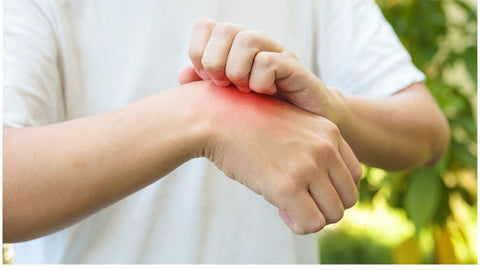
Common Springtime Insects:
During spring, mosquitoes become more active, especially in areas with standing water. Bees and wasps also start buzzing around as they gather nectar and build nests. Other insects, such as ants and ticks, may also become more prevalent.
Being aware of these insects' presence can help you take precautions to avoid bites and stings.
Symptoms of Insect Bites and Stings:
Insect bites and stings can vary in severity depending on the insect and individual reactions. Common symptoms include:
- Redness and swelling around the bite or sting area,
- Itching or burning sensation,
- Pain or tenderness.
In some cases, severe allergic reactions can occur, leading to symptoms like difficulty breathing, facial or throat swelling, and dizziness. These require immediate medical attention.
Essential Homeopathic Remedies:
Homeopathy offers natural remedies that can effectively alleviate insect bites and stings symptoms. Some commonly used remedies include:
Apis mellifica: Made from honeybee venom, this remedy is helpful for bee stings accompanied by swelling, redness, and stinging pain. It can also help reduce swelling in cases of allergic reactions.
Apis Mellifica 30c is designed to support your body in recovery from insect bites or stings.
Ledum palustre: Derived from wild rosemary, this remedy is beneficial for puncture wounds and insect bites, particularly those caused by mosquitoes, ticks, or spiders. It helps reduce swelling and relieve pain.
Hypericum perforatum: This remedy is excellent for relieving pain associated with insect bites, especially those that involve nerve-rich areas like fingers or toes. It can also prevent infection in puncture wounds.
Hypericum 30c is designed to support your body when dealing with intense nerve pain.
Keeping these homeopathic remedies on hand can effectively manage insect bites and stings, allowing you to enjoy springtime activities without discomfort.
Remember to seek medical attention if you experience severe allergic reactions or worsening symptoms.
4. Sunburns
Spending time outdoors becomes more appealing as the sun shines brighter and the days grow longer. However, prolonged exposure to the sun's ultraviolet (UV) rays can lead to sunburn, a typical springtime ailment. Understanding sunburn and how to alleviate its symptoms is crucial for enjoying outdoor activities safely.
Understanding Sunburn:
Sunburn occurs when the skin is exposed to excessive UV radiation from the sun or other sources, such as tanning beds.
UV radiation damages the DNA in skin cells, leading to inflammation and redness. Sunburn can vary in severity, from mild redness to blistering and peeling.

Symptoms of Sunburn:
The symptoms of sunburn typically appear a few hours after exposure to the sun and may include:
- Redness and tenderness of the skin,
- Pain or discomfort, especially when touched or exposed to heat,
- Swelling and inflammation,
- Blisters in severe cases,
- Itching and peeling as the skin heals.
Essential Homeopathic Remedies:
Homeopathy offers natural remedies that can soothe sunburned skin and promote healing. Some commonly used remedies include:
Cantharis: Made from Spanish fly extract, this remedy is effective for sunburn with intense burning pain and blistering. It helps reduce inflammation and relieve pain.
Cantharis 30c may help with bladder infection, blisters with burning pains, and minor burns.
Urtica urens: Derived from the stinging nettle plant, this remedy is helpful for sunburn with itching and stinging sensations. It can also help reduce inflammation and promote healing.
Calendula officinalis: Known as marigold, this remedy is excellent for soothing sunburned skin and preventing infection. It has antiseptic properties and promotes skin healing.
Applying these homeopathic remedies topically or taking them orally can relieve sunburn symptoms and support the skin's natural healing process.
Additionally, it's essential to stay hydrated, avoid further sun exposure, and protect the skin with sunscreen and protective clothing to prevent future sunburns.
If sunburn is severe or accompanied by symptoms like fever or dehydration, seek medical attention promptly.
5. Minor Injuries and Sprains
Minor injuries and sprains can unexpectedly occur during springtime activities such as gardening, sports, or outdoor adventures. Recognizing and treating these injuries is essential for staying safe and enjoying the outdoors.
Common Springtime Injuries:
Minor injuries like bruises, cuts, scrapes, and sprains are common during spring activities. These injuries can result from various causes, including falls, collisions, or overexertion. Sprains, in particular, occur when ligaments are stretched or torn due to sudden twisting or impact.
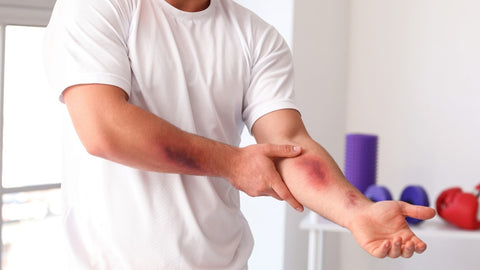
Symptoms of Minor Injuries and Sprains:
The symptoms of minor injuries and sprains may vary depending on their severity but can include:
- Pain, tenderness, or soreness at the injury site,
- Swelling and inflammation,
- Bruising or discoloration of the skin,
- Difficulty moving the affected area,
- In the case of sprains, instability, or weakness in the joint.
Essential Homeopathic Remedies:
Homeopathy offers natural remedies to help alleviate pain and promote healing in minor injuries and sprains. Some commonly used remedies include:
Arnica montana: Known as arnica, this remedy is widely used for treating bruises, muscle soreness, and trauma from falls or blows. It helps reduce pain, swelling, and bruising and accelerates healing.
Arnica Montana 200c is recommended for strong pain, including back and shoulder pain and injuries. It may help manage bruising, muscle soreness, overexertion, trauma, strained muscles, and swelling.
Ruta graveolens: Made from the ruta plant, this remedy is beneficial for injuries to tendons, ligaments, and cartilage, such as sprains or strains. It can help relieve pain, stiffness, and soreness in the affected area.
Ruta GR 30c may help your body deal with joint injuries or strain and bruised tendons.
Bryonia alba: Derived from the wild hops plant, this remedy is helpful for injuries accompanied by intense pain and stiffness worsened by movement. It helps reduce inflammation and promotes healing in injured tissues.
Bryonia Alba 30c is recommended for joint pain that gets worse with motion.
Keeping these homeopathic remedies on hand can effectively manage minor injuries and sprains, allowing you to enjoy springtime activities with minimal disruption.
Remember to rest the injured area, apply ice or heat as needed, and seek medical attention if the injury is severe or does not improve with home treatment.
6. Allergic Reactions
Springtime brings blooming flowers and warmer weather but also an increase in allergens that can trigger allergic reactions in susceptible individuals.
Understanding common allergens and how to manage allergic reactions is essential for enjoying the season without discomfort or health risks.
Common Allergens in Spring:
During spring, pollen from trees, grasses, and flowers fills the air, triggering seasonal allergic rhinitis, also known as hay fever.
Additionally, molds may proliferate in damp environments, exacerbating allergy symptoms. Other common allergens include pet dander, dust mites, and certain foods.
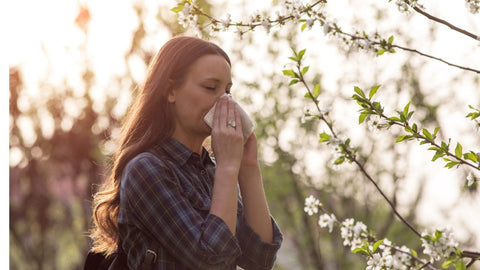
Symptoms of Allergic Reactions:
Allergic reactions can vary in severity and may affect different body parts. Common symptoms include:
- Sneezing, runny or stuffy nose,
- Itchy, watery eyes,
- Skin rashes or hives,
- Swelling of the face, lips, or throat,
- Difficulty breathing, wheezing, or coughing.
In severe cases, anaphylaxis, a life-threatening allergic reaction, may occur, requiring immediate medical attention.
Essential Homeopathic Remedies:
Homeopathy offers natural remedies that help alleviate allergy symptoms and promote well-being. Some commonly used remedies for allergic reactions include:
Allium cepa: Made from the onion plant, this remedy is helpful for allergic rhinitis with profuse, watery discharge from the nose and eyes. It can also help relieve symptoms like sneezing and nasal congestion.
Allium Cepa 30c is designed to support your body when dealing with sneezing, runny nose, and watery eyes.
Euphrasia officinalis: Derived from the eyebright plant, this remedy is beneficial for allergic conjunctivitis, characterized by red, watery, and itchy eyes. It can also help reduce eye inflammation and irritation.
Histaminum: This remedy is prepared from histamine, a substance involved in allergic reactions. It can help alleviate general allergy symptoms like itching, hives, and swelling.
These homeopathic remedies can be taken orally or applied topically to alleviate allergic reactions and promote symptom relief. However, it's essential to identify and avoid allergens whenever possible and seek medical attention if allergic reactions are severe or persistent.
If you want to improve your health gently and safely, or simply treat common mishaps check out more of our homeopathic remedies here.
Additionally, consulting with a healthcare professional before using homeopathic remedies is recommended, especially for individuals with underlying health conditions or those taking medications.

The Bottom Line
As we embrace the beauty of spring, it's essential to be prepared for mishaps that may come our way. By understanding common springtime hazards and having conventional first aid essentials and homeopathic remedies on hand, we can effectively manage insect bites, sunburns, minor injuries, and allergic reactions.
Remember, prevention is key. Taking precautions such as wearing insect repellent, applying sunscreen, and avoiding allergens can help minimize the risk of springtime mishaps. Maintaining a healthy lifestyle, including proper hydration and nutrition, can bolster our body's resilience against common ailments.
With a holistic approach to wellness, we can enjoy the season to the fullest while prioritizing our health and well-being.
So, let's venture into spring with confidence, knowing that we have the tools to tackle any challenges that may arise.

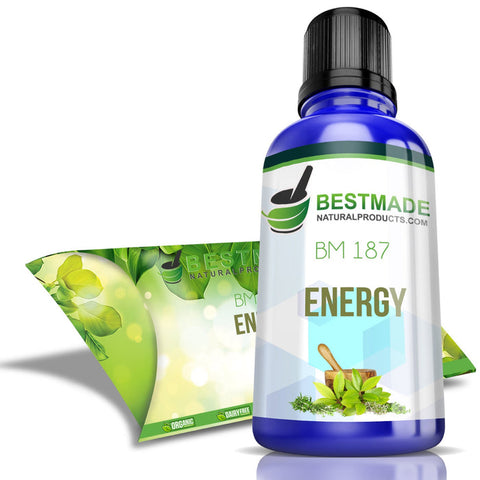
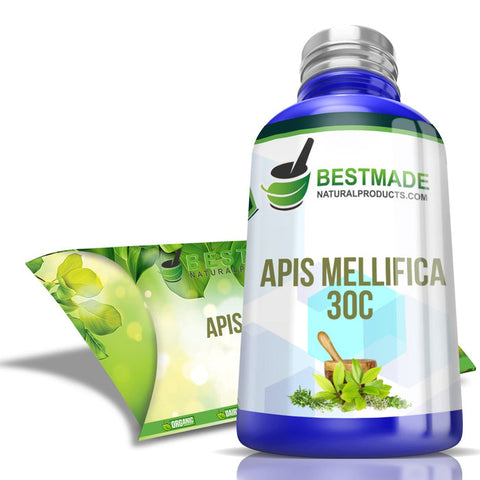

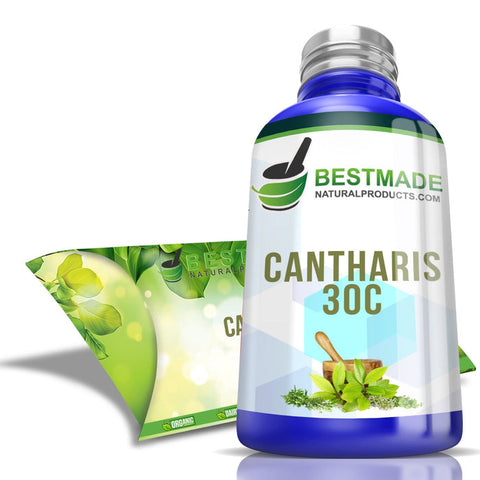
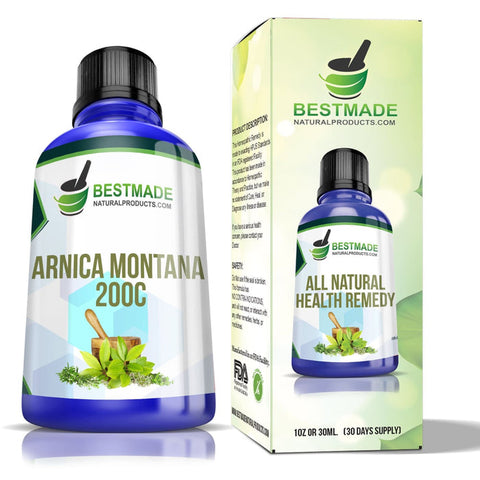
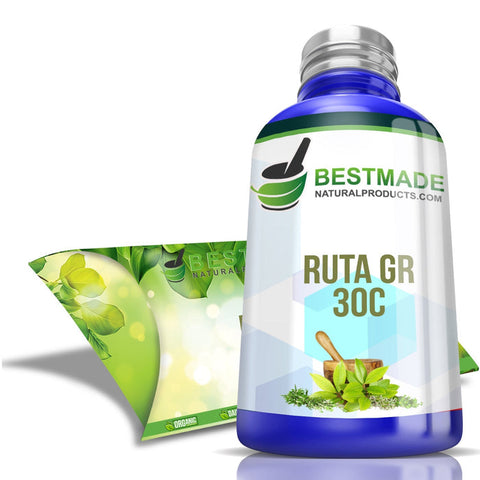
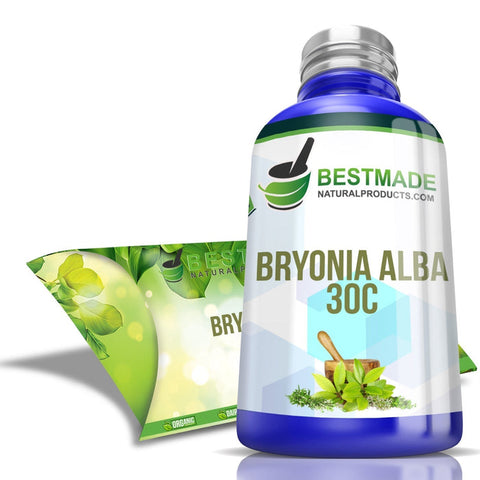

Leave a comment